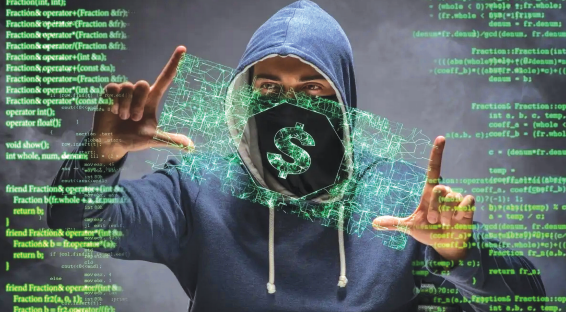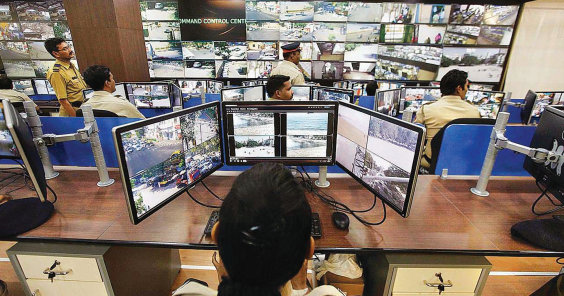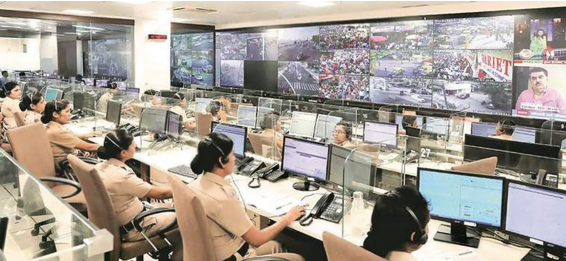Cybercrime is progressing at an incredibly fast pace, with new trends constantly emerging. Cybercriminals are becoming more agile, exploiting new technologies with lightning speed, tailoring their attacks using new methods, and cooperating with each other in ways we have not seen before. D. Sivanandhan, Former Director-General of Police (Retd), Maharashtra, who was also the former Commissioner of Mumbai Police, expressed his concerns about the growing number of cyber attacks in the country. In a heart-to-heart chat with Satya Swaroop, Managing Editor, The Mumbai PROTECTOR, he says that the police must keep pace with new technologies and use these tools for fighting cybercrimes. He also highlights the rampant cybercrime attacks and how they can be prevented. Let us read on and be enlightened by the useful guidelines he has in store for us.
Mr. Sivanandhan, given your extensive experience dealing with some of the most dangerous criminals, do you believe the biggest threats today come from those hidden behind computer screens?
Cybercrime has evolved into one of the most significant threats we face today. As Warren Buffet wisely remarked, “I’m not worried about nuclear war; I’m far more concerned about cyber crimes.” The future of crime is becoming increasingly digital, and that should concern all of us. Innocent and gullible people are easy victims to these crimes, and recovering the money or personal information can be a nightmare.

With the rise in fake calls from individuals pretending to be police officers or other officials, how can people distinguish between a real officer and a fraud? Could you share any incidents that illustrate this?
A recent incident reported by the Times of India highlights the dangers of sophisticated scams. Just last month, a female CEO fell victim to an elaborate scheme. She received a video call from someone impersonating a police officer, complete with a uniform and credible threats from a fake CBI setup. The scammers presented official-looking emblems and documents, ultimately defrauding her of Rs 25 Crores—a loss larger than any I’ve encountered in my career. The scammers even used fake letters with multiple department stamps, a forgery that would have taken years to fabricate.
To spot a fake, pay attention to the method of contact. A genuine police officer will never threaten you over a video call. If you receive such a call, it is a deep fake, and you should not trust it. A legitimate officer will contact you through official channels, such as a formal request to visit the police station. Another common scam is the fake FedEx parcel containing narcotics, where they threaten you with the NDPS Act and demand money to avoid imprisonment. My advice is simple: if a ‘police officer’ looks too good to be true, hang up and block the number.

If someone fall victim to such a scam despite being vigilant, how can they recover their money and ensure these fraudsters are brought to justice?
While you may not be able to take direct action, the police can. The key is prevention—pause, think, and act before reacting to any suspicious situation. Do not let fear, greed, or anger dictate your actions. If you do fall victim, report it immediately. Call the cyber cell at 1930 or visit your nearest Cyber Police Station. Every police station in the country now has cyber technology and trained officers. Quick reporting is crucial; the sooner you report, the better the chances of stopping the flow of money and recovering your funds.

So, being vigilant and prompt in reporting is essential?
It is always crucial to be vigilant and report the matter as soon as you realise that fraud has been committed. The window for recovering your money is often within the first three days. For instance, an actor recently lost Rs 4.4 Lakhs. He wasted no time reporting the matter to the police. Thanks to the swift action of the Mumbai Police, 90% of the money was recovered.
Would you like to share some more useful tips for our readers?
I do have a list of advisories to enhance your situational awareness and may save you from becoming the next victim.
• Fake International Parcel Scam: Fraudsters pose as delivery agents, asking for personal info and payment. Verify deliveries via official websites and tracking IDs.
• Drugs-in Parcel Scam/Digital Arrest: Scammers claim a parcel with contraband was intercepted. They pose as officials, threatening with fake charges and demand money. Verify calls, check official papers, and report to authorities.
• False Credit Card Transactions: Automated calls claim unauthorized credit card use, asking for card details. Always contact your bank directly.
• Electricity/Telephone Disconnection Scam: Fake SMS warns of disconnection unless payment is made via provided link. Verify directly with your service provider.
• Business Email Compromise (BEC): Scammers impersonate trusted figures, requesting urgent money transfers. Always confirm requests directly with the person involved.
• Fake Customer Care Numbers: Fraudsters create fake customer service numbers to steal info. Use numbers only from official company websites.
• Phishing: Fraudulent emails steal personal info like card details. Avoid suspicious links.
• Smishing: Fake SMS trick you into sharing sensitive info or installing malware. Stay vigilant.
• Vishing: Fraudulent calls ask for sensitive info. Be cautious and verify the caller’s identity.
• Online Job Fraud: Scammers offer fake jobs with high pay. Verify offers thoroughly before sharing any details.
• Investment Fraud: Scammers lure you into fake investments promising high returns. Conduct due diligence before investing.
• Relationship Scams: Scammers gain trust through fake relationships to steal money or info. Be wary of online-only relationships.

• Refund Fraud: Scammers offer to recover lost money for a fee, but steal more instead. Do not pay upfront fees for refunds.
• LIC/Insurance Scams: Fraudsters pose as officials asking for money for policy refunds. Verify any requests directly with the company.
• Lottery/Advance Fee/Online Loan Scams: Victims are asked to pay upfront for lottery winnings or loan approvals. These payments are never followed by any actual services.
• Emergency Scam: Scammers pretend a loved one is in urgent need of money. Always verify the situation directly.
• Extortion: Scammers threaten with harm or arrest to extract money. Report such threats immediately.
• Sextortion: Predators blackmail victims with intimate images, demanding money or more images. Never share such content online.
• Cyber Bullying: Online harassment through digital devices. Report and block the perpetrator.
• Cyber Stalking: Repeated, unwanted online contact or monitoring. Report and take legal action.
• Sexting: Sending explicit digital content. Be aware of the risks, especially regarding privacy.
• Fake Websites: Fraudsters create fake stores or login pages to steal info. Only shop from trusted, verified sites.
• Spamming: Unsolicited messages try to sell products or steal info. Avoid engaging with spam.
• Fake Uber Fare Scam: Drivers use fake app screens to show inflated fares. Verify the fare directly on your Uber app.
• Fake QR Codes: Scammers create fake QR codes to steal money. Verify the authenticity before making payments.
• Travel Scams: Fake offers for vacations that lead to hidden fees or scams. Research thoroughly before booking.
• Discount Scams: Scammers lure victims with fake discounts, leading to fraudulent transactions. Verify offers before purchasing.
• Cyber Grooming: Predators build online relationships with minors to exploit them. Monitor and educate young users about online safety.
How to Avoid Internet Scams
For those wondering how to avoid being scammed online, here are some sensible tips you can follow to stay safe.
Protect Your Details: Never send money or share personal info with unknown or untrusted sources.
Be Wary of Unsolicited Emails: Avoid clicking on links or opening attachments from suspicious emails or texts. Don’t respond to requests for personal or financial information.
Decline Remote Access Requests: Hang up on calls from strangers asking for remote access to your computer—they might install malware.
Secure Your Devices: Use strong passwords, protect your Wi-Fi with a password, avoid public Wi-Fi for sensitive tasks, and update security regularly.
Create Strong Passwords: Use long, unique passwords with a mix of letters, numbers, and special characters. Change them regularly.
Manage Privacy Settings: Review and adjust privacy settings on social media. Be cautious with connections and report any suspicious activity.
Download Safely: Only download or stream content from trusted websites to avoid malware risks.
Avoid Pressure Tactics: Do not give in to urgent demands for payment or information—these are likely scams.
Trust Your Instincts: If an offer seems too good to be true, it probably is. Be cautious of unrealistic discounts or prizes.
Secure Your Connection: Use a VPN for secure internet browsing and ensure websites show a lock symbol and “https” in the URL for secure transactions.
In the online world, follow the ABC rule –
Assume Nothing, Believe Nobody, Check Everything. Stay alert and be wary of people unexpectedly contacting you by email or phone and asking for your personal information.






